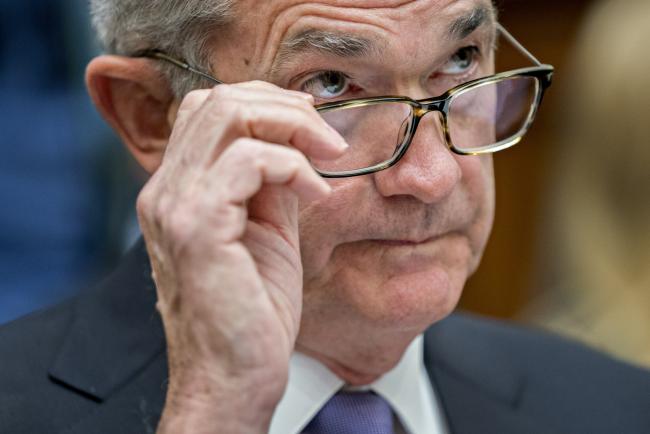(Bloomberg) -- Don’t count on a Powell Pause.
That’s the message seasoned watchers of the Federal Reserve have for any investors hoping that turmoil in Turkey and the wider emerging-market selloff would stay the hand of Chairman Jerome Powell from raising interest rates.
While international developments did cause the U.S. central bank to hold back in 2015 and 2016, there are big differences between now and then. U.S. unemployment was higher and underlying inflation was lower. But perhaps more importantly, the nexus of the turbulence was China, whose economy is the world’s second largest and more than 10 times the size of Turkey’s.
“The broad conclusion from history is that the U.S. can generally ignore what happens in emerging markets, unless it involves China,” said Michael Gapen, chief U.S. economist at Barclaysand a former section head at the Fed Board in Washington.
Investors agree with that assessment. Despite fears of Turkish contagion, odds of a Fed hike in September were unchanged from a week ago at 90 percent, according to pricing in federal funds futures, with the probability of another move in December seen at roughly 55 percent.
Fed officials will “be concerned, they’ll be worried and they’ll be monitoring, but they’re not going to take any action on U.S. monetary policy until they expect that crisis to spill over in some substantive way into the U.S.,” said Robert Martin, U.S. economist at UBS Group AG who formerly ran an international capital markets section at the Fed.
So far, the fallout has been limited. While U.S. stock markets have wobbled in recent days in response to the turbulence in Turkey, they’re still near all-time highs. The emerging-market jitters have pushed up the dollar, which on the margin could crimp U.S. economic growth by making it more expensive for companies to export. But that potential drag has been partly offset by a fall in long-term interest rates.
“If you look at how Turkey is affecting U.S. financial conditions, at the moment you barely see it,” said Roberto Perli, a partner at Cornerstone Macro and a former Fed Board economist.
The U.S. economy looks poised to rack up another quarter of solid growth after expanding at its fastest pace since 2014 in the April-June period. Economists surveyed by Bloomberg News earlier this month raised their forecast for third quarter growth to 3 percent, from 2.8 percent in July. Gross domestic product climbed at a 4.1 percent pace in the second quarter.
A National Federation of Independent Business survey released Tuesday showed a gauge of optimism among U.S. small-business owners increased to the second highest on record as companies benefited from tax cuts and robust consumer demand.
Fed officials, including Powell, have long maintained that the best way they can help global financial stability is by keeping U.S. growth on track, while communicating clearly about where policy is heading to avoid surprises.
“Maintaining the U.S. economy on a sustainable trajectory, including through transparent monetary policy implementation and effective and efficient regulation, is our best means of contributing to prosperity both at home and in the broader global community,” New York Fed Executive Vice President Simon Potter told an audience in Manila on Aug. 4.
Policy makers stress communication because they want to avoid a repeat of the 2013 taper tantrum, when remarks by then-Fed Chairman Ben Bernanke about the possibility of beginning to taper the central bank’s asset purchase program caught investors off guard and gave emerging markets a spasm.
Yuan Devaluation
That’s not to say Fed policy is immune to developments abroad. In 2015, the central bank put off a long-expected September rate increase after a surprise currency devaluation by China the month before sent financial markets worldwide into a tizzy. The same thing happened in 2016, as the Fed delayed rate hikes amid severe emerging-market volatility sparked by concerns the Chinese economy was slowing sharply.
Powell argued in May that emerging markets were in a good position to manage the ongoing normalization of U.S. monetary policy. They “have made considerable progress in reducing vulnerabilities since the crisis-prone 1980s and 1990s,” he said in a May 8 speech in Zurich.
Dollar Liquidity
But that progress hasn’t been uniform, leaving some of them -- like Turkey -- exposed as the U.S. central bank withdraws liquidity from the world financial system by incrementally shrinking its balance sheet and gradually raising interest rates.
“Argentina, Colombia, South Africa and Mexico stand out as fragile” as well because of their large current-account deficits, sizable external debt and high inflation, Tom Orlik, chief economist for Bloomberg Economics, wrote on Monday.
Argentina on Monday acted to stabilize its tumbling currency, jacking up its already highest-in-the-world policy interest rate by 5 percentage points to 45 percent.
Adding to the stresses is President Donald Trump’s belligerent stance on trade.
“The U.S. is not playing its usual role to try to tamp down anxiety and fears,” said David Hensley, director of global economics for JPMorgan Chase & Co in New York. “If anything, the U.S. has been throwing fuel on the fire.”
Turkish markets, already in a tailspin over President Recep Tayyip Erdogan’s economic policies, tumbled further after Trump’s Aug. 10 announcement that the U.S. is doubling steel and aluminum tariffs on shipments from the country.
The fire, though, will have to get a lot hotter to get the Fed to change course. “We’re far from that,” said HSBC Securities Inc. chief U.S. economist Kevin Logan. “There would have to be a lot more contagion.”
